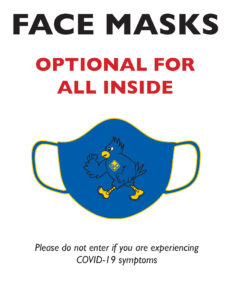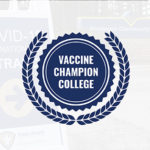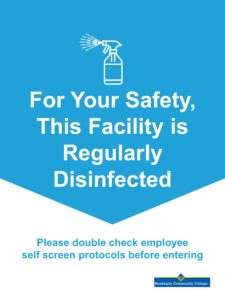Wearing of Face Masks Optional
The wearing of face masks is optional inside MCC campus  buildings and facilities EXCEPT for an individual who has been exposed to someone with COVID-19.
buildings and facilities EXCEPT for an individual who has been exposed to someone with COVID-19.
Please ensure kindness and respect to individuals who do wear face masks. Meanwhile, anyone experiencing COVID symptoms or other illness should NOT enter any MCC campus location.
MCC In-Person Office Hours
As part of Phase 5 of its Campus Plan to Reunite, Muskegon Community College has resumed in-person student services on its main campus, at its Ottawa Center in Grand Haven and at its NCRESA office in Fremont.
Vaccine Champion College
 Muskegon Community College (MCC) joined the national COVID-19 College Vaccine Challenge, which was announced on June 2, 2021 by White House officials.
Muskegon Community College (MCC) joined the national COVID-19 College Vaccine Challenge, which was announced on June 2, 2021 by White House officials.
As a participant and a Vaccine Champion College, MCC reaffirms its commitment to educate all campus community members about the availability of COVID-19 vaccines and how to access them, and to encourage everyone to receive a vaccine.
MCC Campus Plan to Reunite: Current Status Phase 5
The Muskegon Community College Campus Plan to Reunite will be done in phases, with the most important focus being on the safety of our students, our employees and our community. In addition to active cases within the MCC campus community, the determination of phases will be guided by the Muskegon Public Health Department Guidelines, Michigan Community College Association (MCCA) guidance, and campus preparedness. The MCC Campus Plan to Reunite is a living document with the flexibility to adjust phases based on local, state and regional pandemic status.
Click here to view a full description of the six phases of the MCC Campus Plan to Reunite
COVID-19 Information – Local, State and National
National: CDC Coronavirus Disease website
Campus Health and Safety Protocols
MCC’s top priority is to keep the college’s community safe amid the COVID-19 pandemic. So, as we continue to transition back into the workplace, we encourage individuals to maintain a safe and healthy environment for learning and working.
Supporting Good Public Hygiene Practices
MCC has strategically placed hand sanitizing stations in public spaces across campus. To assist efforts to protect the health of the community, MCC community members should take the following preventive measures to help avoid infection:
- Frequently wash hands with soap and warm water for at least 20 seconds. If soap and water are not available, use an alcohol-based hand sanitizer.
- Avoid touching eyes, nose and mouth with unwashed hands.
- Avoid close contact with people who are sick, and stay home when sick.
- Cough or sneeze into a tissue or sleeve, and wash hands
- Frequently disinfect surfaces with wipes.
- Avoid non-essential travel to highly affected states, countries or regions in the world.
Campus Cleaning, Sanitizing and Disinfecting
Campus health and safety depends on all of us. We can and will impact the campus community by taking personal responsibility when it comes to precautions and safety protocols.
Muskegon Community College Physical Plant is continuing its augmented cleaning, sanitizing and disinfecting procedures in an effort to provide a healthy campus environment. Following guidance from CDC, and OSHA, staff will prioritize services to help in slowing the spread of COVID-19.
The Physical Plant is dedicated to the health and safety of our campus community. Disinfecting protocols have been heightened throughout the entire campus in accordance with CDC guidelines in an effort to make sure all horizontal and vertical surfaces, along with critical touchpoints, will be addressed on a daily basis.
This daily activity would include but not limited to:
- Entrances
- Classrooms
- Learning spaces
- Restrooms
- Entrances
- Stairwells
- Corridors
- Common/public spaces
- Elevators
- Lounges
Physical Plant continues using electrostatic disinfecting application devices to apply Sniper Disinfectant and Vital Oxide to augment cleaning and sanitation procedures on campus. To support these efforts, the custodial department has introduced Electrostatic disinfecting application devices. The electrostatic applicator gives a negative charge to the disinfecting  solution as it exits the nozzle, allowing an even coat of solution that sticks to a targeted surface with 360-degree coverage. This is in conjunction with current disinfecting and sanitizing products. These solutions destroy microorganisms, disrupting the growth process and making it unable to reproduce, effectively destroying potentially harmful organisms. The product is safe for skin, clothes and the environment. When applied, it does not produce harmful byproducts or produce VOCs.
solution as it exits the nozzle, allowing an even coat of solution that sticks to a targeted surface with 360-degree coverage. This is in conjunction with current disinfecting and sanitizing products. These solutions destroy microorganisms, disrupting the growth process and making it unable to reproduce, effectively destroying potentially harmful organisms. The product is safe for skin, clothes and the environment. When applied, it does not produce harmful byproducts or produce VOCs.
The Physical Plant is applying a new product, MicrobeCare, to further enhance our cleaning and sanitizing protocols. The product creates a barrier that kills 99.99% of microbes, prevents mutation (superbugs) and minimizes the spread of bacteria, viruses, fungi, algae and yeast on a wide variety of products and surfaces. MicrobeCare is safe and has proven results in highly sensitive healthcare environments. The extended residual benefits of the product make it a positive investment in providing a healthier campus.
This product is being applied to all touchpoints within buildings, including but not limited to light switches, handrails, door handles, counters, vending machines, tabletops, chairs, computer keyboards, restroom fixtures, elevators, entries, etc. to combat the possible exposure to COVID-19.
Classrooms and Conference Rooms
Classrooms and conference rooms will be sanitized daily.
Hand Sanitizing Stations:
Wall- and stand-mounted hand sanitizing stations have been installed in common accessible areas.
Physical Plant – Custodial Operations
Custodial Staff will focus on frequent cleaning of high touch points throughout the day. Restrooms will be cleaned and sanitized daily. Crews will wipe down common areas, including tables and furnishings, and will also sweep, mop and vacuum. Disinfection equipment and procedures will be utilized following appropriate guidelines.
- Classrooms will be sanitized daily by custodial staff.
- Offices will have limited service per the established building and users schedules.
- Trash will be removed daily as needed.
- Departments and lab spaces will be responsible for sensitive or unique equipment including but not limited to computer screens and keyboards.
Air Quality
Physical Plant continues to follow ASHRAE and OSHA guidelines while performing equipment service on HVAC equipment to mitigate COVID-19. These include increased ventilation and outside air intake, increased occupancy schedules, inspection frequency, replacement of air filters, cleaning/sanitizing/disinfecting and maintenance of the systems.
MCC Response to the Coronavirus
- Supporting Our Students – Since the outset of the COVID-19 pandemic, MCC quickly acted to assist our current and incoming students with regard to their health and safety concerns, their sudden transition to remote learning, their apprehensions about being able to begin and/or continue their MCC education, and their ability to earn their degrees and certificates on time. Read more
- CARES Act and Emergency Grants – Muskegon Community College received $1.12 million from the federal government through the Coronavirus Aid, Relief, and Economic Security (CARES) Act Higher Education Emergency Relief Fund. This funding provides emergency grants to students whose lives have been disrupted by COVID-19. To find out more, click here.
- CRRSAA and Emergency Grants – Muskegon Community College received $1.12 million from the federal government through the Coronavirus Response and Relief Supplemental Appropriations Act (CRRSAA) federal relief package. This funding provides emergency grants to students whose lives have been disrupted by COVID-19. To find out more, click here.
- ARP and Emergency Grants – On March 11, 2021, the American Rescue Plan (ARP) Act federal relief package was signed into law. Muskegon Community College was allocated $8,367,136 through ARPA and the Higher Education Emergency Relief Fund III (HEERF III). At least $4,247,002 of these total funds must be distributed as grants to students. Similar to the CARES Act and CRRSAA, a portion of this funding is intended to provide emergency financial aid grants to students whose lives have been disrupted by COVID-19. Also similar to CRRSAA, ARP requires that institutions prioritize students with exceptional need. The grants may be used for any part of the student’s cost of attendance or for emergency costs that arise due to coronavirus, such as tuition, food, housing, health care (including mental health care) or childcare. In accordance with Section 314(a)(1) of CRRSAA and 2003(a)(1) of ARP, MCC plans to distribute ARP funds and the remainder of the student CRRSAA funds to eligible students during the Fall 2021 and Winter 2022 semesters.
- Contact Information If you are unsure who to contact, or for any questions about MCC operations while on-site operations are limited, call (231) 773-9131.
Muskegon Community College COVID Response Team
Since March 2020, MCC COVID Response Team members have met regularly to plan for and implement any necessary actions surrounding the college’s response to the coronavirus pandemic. Using public health and CDC guidance, the team makes recommendations to the President’s Cabinet. The team is led by Provost/Executive Vice President Dr. John Selmon with representatives from Academic Affairs, Human Resources, Student Success, Physical Plant, Financial Services, Marketing and Communications, Information Technology, Compliance, Nursing, Respiratory Therapy, College Services, Athletics, Institutional Research and Grants, and Strategic Initiatives.







